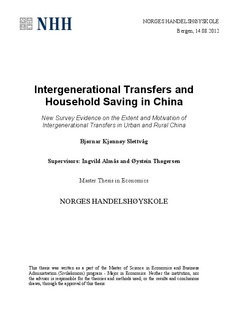Intergenerational transfers and household saving in China : new survey evidence on the extent and motivation of intergenerational transfers in urban and rural China
Master thesis
Permanent lenke
http://hdl.handle.net/11250/169961Utgivelsesdato
2012Metadata
Vis full innførselSamlinger
- Master Thesis [4372]
Sammendrag
This thesis offers new insights explaining the lack of dissaving among elderly in China. We
provide new survey data from China with detailed information on the economic situation of
elderly, and in particular on the interaction between elderly parents and adult children. We
present data on the extent of inter-vivos transfers and intended bequests, and we test whether
these transfers represent strategic interaction with adult children, reflecting life-cycle and
precautionary motives for wealth accumulation, or altruistic motives.
We find that elderly Chinese on average intend to pass along more than six times their yearly
net income in bequests and large inter-vivos transfers to their children. We also reveal that
these transfers serve as strong motives in the saving behaviour of the old generation in
China. Furthermore, we find that the extensive amount of transfers fits better to an exchange
model of intergenerational transfers than to an altruistic model. Recipient’s earnings affect
downward transfer amounts positively, and both the probability of receiving bequests and
downward transfer amounts correlates positively with strategic child interaction. We find a
positive relationship for elderly-care provision by adult children, and, for a subset of the
population, evidence of intra-family annuity markets where children provide elderly parents
with regular financial support in exchange for increased bequests. We find only weak
indications of intergenerational transfers motivated by altruism, and this effect is
concentrated among those with the highest income levels.
The findings have powerful implications both theoretically and for policy making. First, they
contribute with supportive evidence to the debate over the capability of life-cycle motives to
explain wealth accumulation among elderly in China. The findings also suggest that large
amounts of bequests and intergenerational transfer not necessarily are contradictory to such
saving motives. Indeed, the findings indicate that downward intergenerational transfers have
an important role in securing elderly-life care and income security for elderly in China. This
has implications for new governmental social security and health care programs that need to
carefully take into account the effect such programs will have on intergenerational transfers.
